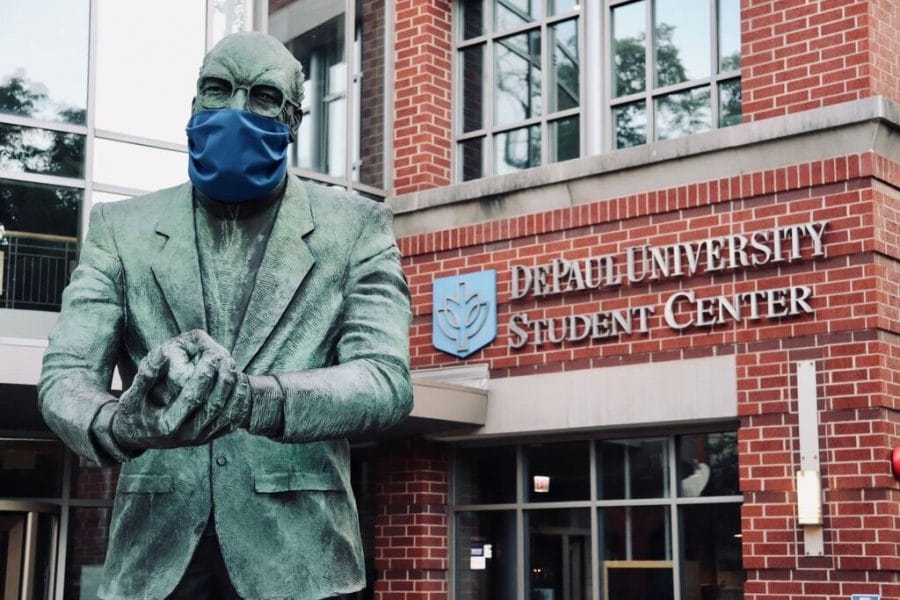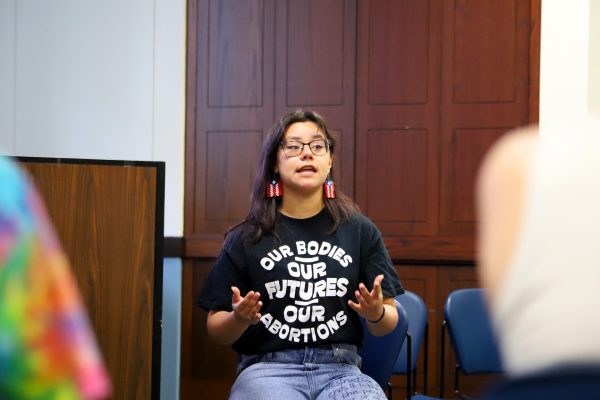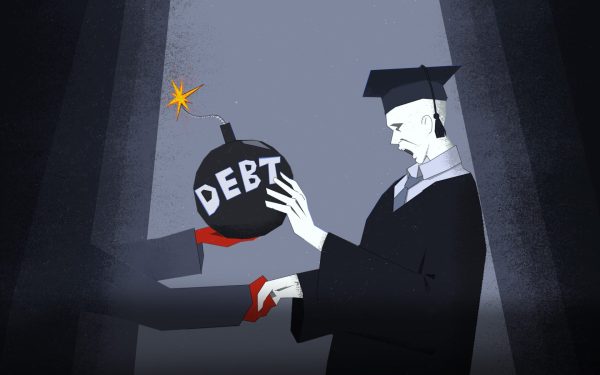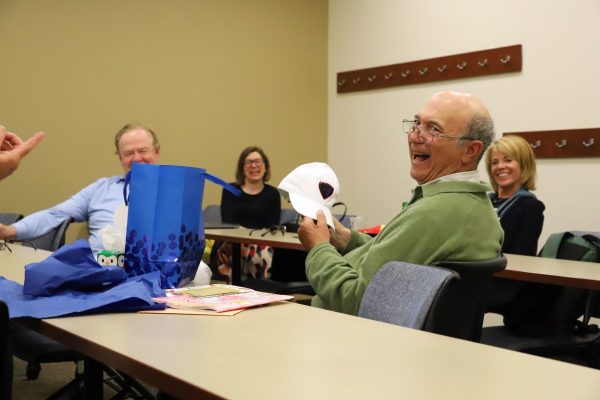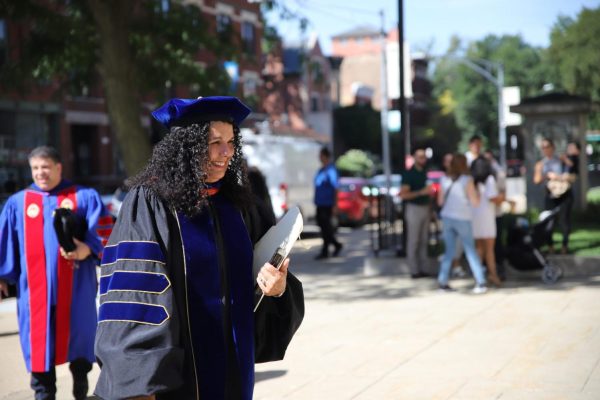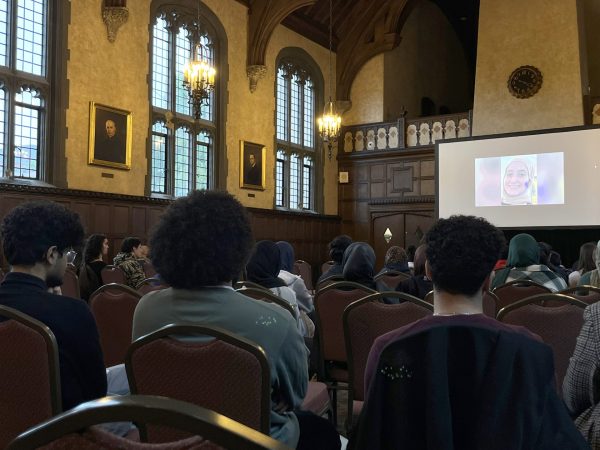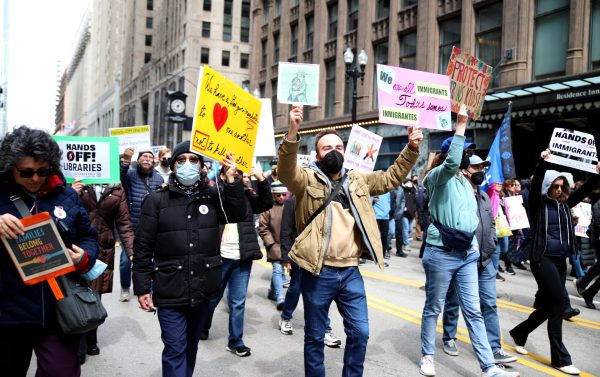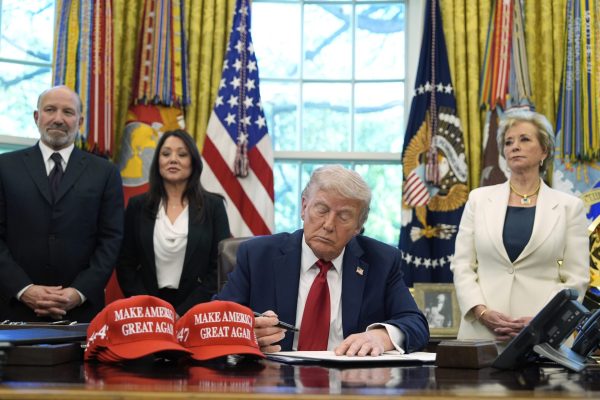DePaul: No current plan to drop mask mandate despite new CDC guidelines
Credit: Eric Henry
The statue of John J. Egan, located outside of the Lincoln Park Student Center, wearing a mask.
The Centers for Disease Control and Prevention announced on May 13 that fully vaccinated people can ease mask wearing, allowing them to safely forgo wearing masks inside at most places.
The guidelines still recommend wearing masks in crowded indoor settings but works towards reopening workplaces, schools and other settings as well as removing social distancing guidelines for those who are fully vaccinated.
The CDC first recommended that people wear masks in April of 2020 and on May 1, the Illinois government ordered a statewide mask mandate.
The university has required the DePaul community to wear face coverings on both campuses, since June of 2020.
Despite the CDC’s easing of mitigations, DePaul’s Covid-19 vaccine page –– last updated on May 13 –– encourages students who do receive the vaccine to continue following Covid-19 safety protocols.
“Keep in mind that the vaccine is only one part of preventing the spread of Covid-19,” the website reads. “Please continue to wear a face mask and practice social distancing–even if you have been vaccinated–to help Take Care DePaul (sic).”
Most of DePaul’s student population became eligible for vaccination a few weeks ago when the city of Chicago entered Phase 2 of the vaccination distribution process on April 19.
Phase 2 increased vaccine eligibility to Chicagoans ages 16 and up without any specifications related to employment or underlying medical conditions.
Craig Klugman, a health sciences professor and member of DePaul’s Covid-19 task force, said that given when most students became eligible for the vaccine, the two-shot regimen and the time it takes to reach immunity, DePaul will most likely keep mask mandates throughout the spring quarter.
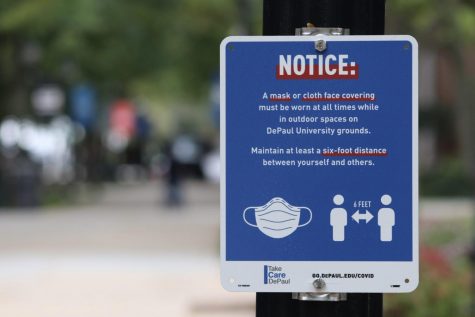
Russell Dorn, a spokesperson for the university, told The DePaulia that DePaul will not make any changes to their facial covering requirements until closer to the 2021-2022 fall quarter.
“As we have done since the start of the pandemic, DePaul will follow guidance from the Centers for Disease Control, the Chicago Department of Public Health, and our medical advisor from AMITA Health as we continue making plans for fall,” Dorn said. “Since a lot can change between now and then, we are waiting until closer to the start of fall quarter to make decisions on specific mask, physical distancing and event guidelines.”
As most DePaul students continue their courses until June, Illinois and the city of Chicago have both entered the Bridge Phase this past weekend –– a transitioning period before the fifth and final phase of fully reopening in which all areas of the economy can reopen with normal operations and large scale events can take place.
Both the city and the state have moved forward with mitigating Covid-19 protocols and decreased capacity limits and business operations until public health experts confirm that transitioning into Phase 5 –– fully reopening –– is safe.
On May 12, the CDC recommended the use of the Pfizer Covid-19 vaccine for children ages 12 and up, following the U.S. Food and Drug Administration’s authorization on May 10.
Prior to beginning the Bridge Phase, Chicago’s Department of Public Health announced on May 11 that Covid-19 vaccination sites will be open to children ages 12 to 15 beginning May 13 to receive the Pfizer vaccine.
As of May 14, all Chicago businesses have the option of adopting the new vaccine exemption policy, whereas fully vaccinated individuals do not have to count towards Covid-19 capacity limits across all industries.
The policy allows bars, restaurants and other establishments to increase table or party size above the 10-person limit if all members within the party are at least 16 and are fully vaccinated. Also, establishments with a late-hour liquor license can operate without hour restrictions if fully-vaccinated guests are allowed on the premises during late-hour operations.
If businesses do not adopt the new policy, then they have to adhere to the Chicago Bridge Phase guidelines.
Some members of the DePaul community are weary of the CDC’s latest guidance.
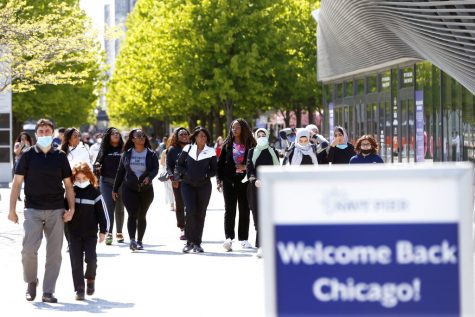
“There are some studies that show that vaccinated people are unlikely to become seriously ill and also are unlikely to pass on the virus to others, and that’s part of the reason behind the CDC statements,” Klugman said. “So while there may be scientific evidence, I do not think that enough of the population has been vaccinated yet to justify completely eliminating masks.”
The CDC’s Covid-19 data tracker shows that as of May 15, 46.6 percent of people ages 18 and older in the U.S. are fully vaccinated, while 59.4 percent have received at least one dose of the Covid-19 vaccine. Overall, 36.7 percent of the U.S. total population are fully vaccinated while 47.1 percent have received one dose.
“One problem is that this new guidance depends on the honor system — that everyone who is not vaccinated wears a mask and we know that’s not the case,” Klugman said. “I fear that everyone will abandon masks, whether vaccinated or not, and act like the pandemic is over.”
DePaul will require students to be fully vaccinated prior to returning to campus in-person in the fall, but there are still a few exemptions to immunization requirements pertaining to medical and religious reasons that students can qualify for.
“One of the reasons for masking is to protect others — those who have chosen to be unvaccinated and those whom for medical or religious reasons cannot be vaccinated or children who do not have an approved vaccine or people who are immunocompromised and do not develop an immune response to the vaccines,” Klugman said. “… Suddenly we are doing nothing to help keep those people safe. So two factors concern me: that we are now relying on everyone being honest about their vaccine status and masking and that we are putting vulnerable people at risk.”
Klugman believes that after over a year of wearing masks, the CDC’s rate of relaxation is too quick.
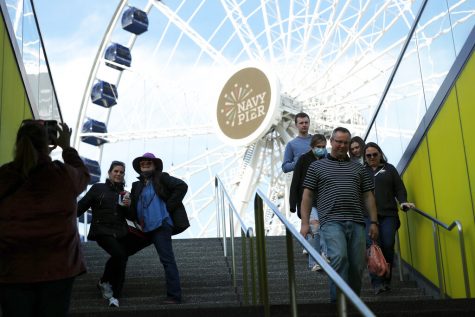
“Walking around, I see that most people are not wearing the mask,” Klugman said. “We have spent 14 months wearing masks and distancing, and I think we should be relaxing our behaviors at a slower rate than the CDC announcement. I am certainly more cautious and conversative in my approach to behavior in the pandemic, but it seems to me that this is too relaxing, too soon.”
Despite the CDC’s advice, the Chicago and Illinois Department of Public Health have yet to adjust their mask guidelines.
In the Chicago Bridge Phase guidelines, the city’s statement reads that establishments should reference the industry-specific Gradually Resume guidelines, all of which still include strict adherence to physical distancing, masking, health screening and sanitation protocols.
America’s public health system is a decentralized network, meaning the CDC does not dictate or overrule local and state public health departments; it only provides support, research and guidelines. Public health governance structures differ state to state.
“Remember that the CDC issues guidelines, not rules,” Klugman said. “It is up to state and city departments of public health to create rules for their communities. DePaul falls under the Chicago Department of Public Health and so that’s who we listen to.”
Although the CDC has released updated guidelines in regards to fully vaccinated people the organization has not updated their Considerations for Institutions of Higher Education page since April 27 at the time of publication.
Klugman said the CDC plans to release updated guidelines for schools, but not for several weeks.
DePaul hosted a Moderna vaccine clinic from April 27-30 and plans to host another in May for members of the DePaul community to receive their second dose.
“What you do at home and away from campus is your own choice,” Klugman said in regards to whether fully vaccinated DePaul students should abide by the CDC’s latest guidelines. “It’s only been two weeks since most DePaul students became eligible for the vaccine and literally days since people over 12 became eligible. With the two-shot regimen, that means we are still at least a month from our student population in general being vaccinated.”
Dorn told The DePaulia more mask and Covid-19 information should be made available in the summer.

